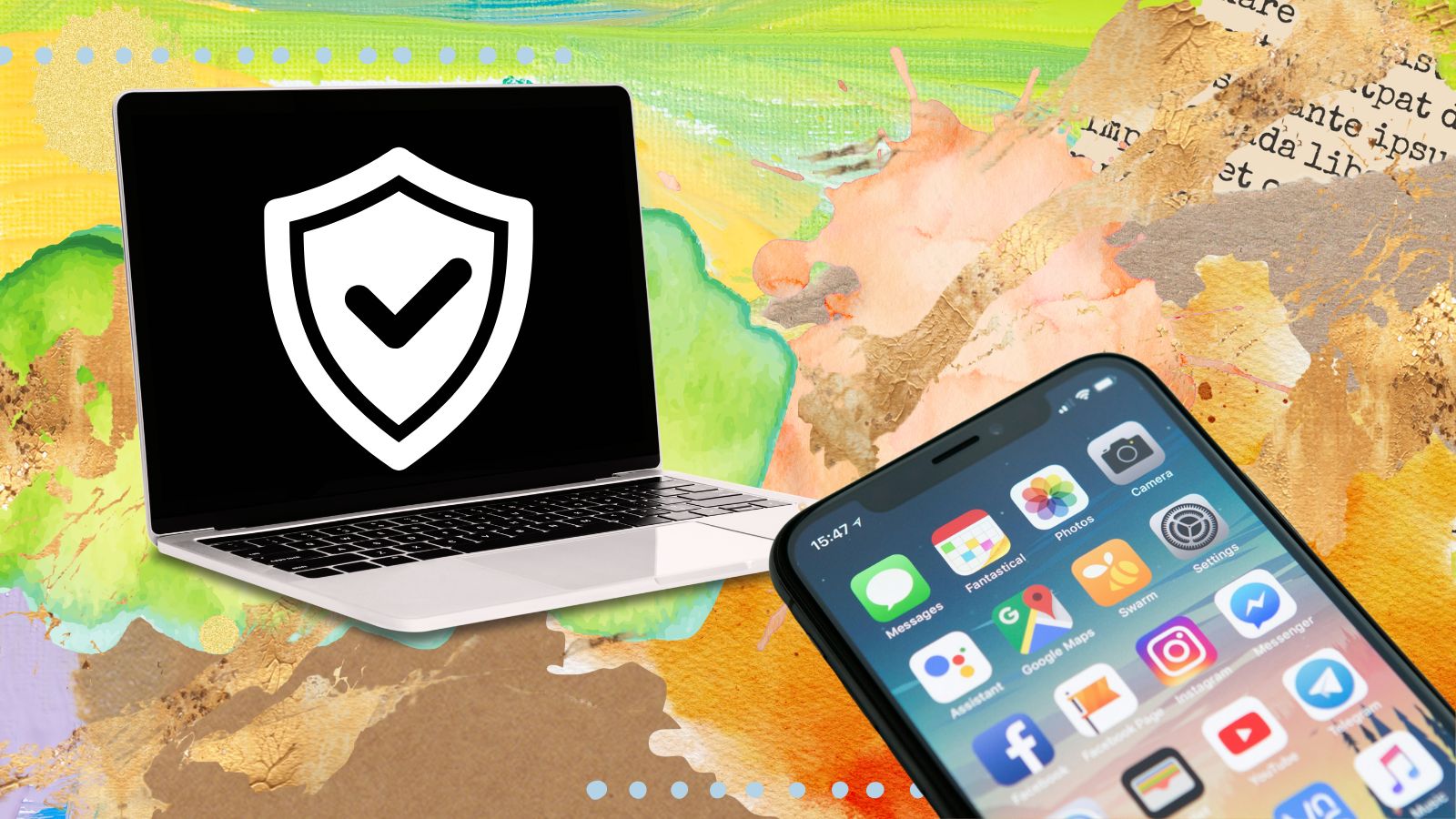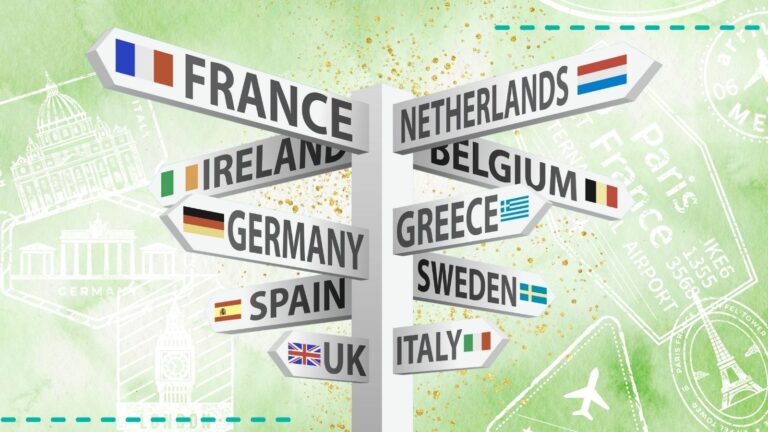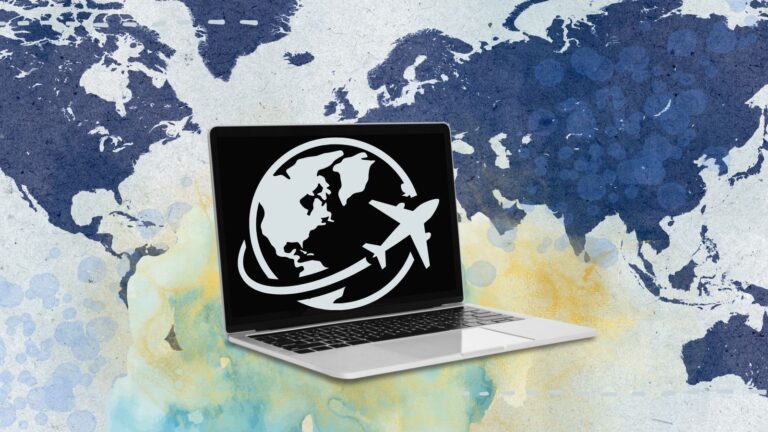Why You Need a VPN When Traveling
Usually when you’re planning for a long trip, you’re worried about what to pack, getting tickets, where to stay, etc. and the little things tend to fall to the side. Little things like, say, internet safety!
If you’re not used to thinking about it, you could forget that bad actors are constantly trying to get into your personal devices. Anytime you use a public wifi connection, for instance, you chance having someone get in there and steal your bank info.
I’m a fairly techy person but I didn’t even think about the problems using shared wifi to access my bank into while traveling around the world until last year. I was happily using hotel wifi, AirBNB wifi, coffee shop wifi– all without taking any precautions!
Luckily nothing happened and I set up a VPN service once I realized my mistake. I honestly think every traveler should have a VPN on their personal devices, not only to protect their personal info but just to generally stay safe online.
Never heard of a VPN before? No worries!
This guide will walk you through everything you need to know about using a VPN (Virtual Private Network) while traveling, even if you’re not very familiar with technology. I’ll cover what a VPN is, why you need one, and how to use it on your computer and phone. By the end, you’ll feel confident in staying safe and connected no matter where your travels take you.
Just Gone Wandering is supported by readers! This post contains affiliate links. If you click on a link and buy something, I get a small percentage at no extra cost to you. Your support helps keep this blog running— thank you! Read full disclosure here.
What Is a VPN?

A VPN, or Virtual Private Network, is a tool that helps protect your privacy when you’re online. It works by creating a secure connection between your device (like a computer or phone) and the internet.
This connection hides your online activities from anyone who might be trying to spy on you, such as hackers, advertisers, or even the government.
Think of a VPN as a tunnel that your internet traffic goes through.
On one side, you have your device, and on the other side, you have the websites or services you want to use.
When you connect to a VPN, your internet traffic is encrypted (scrambled) so that only you and the VPN server can understand it. This makes it much harder for anyone to see what you’re doing online or to steal your personal information.
Related: The Ultimate Tech Guide for Full-Time Travelers
Why You Need a VPN When Traveling
Using a VPN while traveling is important for several reasons, even if you’re just doing basic things online like checking email or browsing social media. Here’s why:
Protecting Your Data on Public Wifi
When you’re traveling you’ll likely connect to public wifi networks in places like airports, hotels, cafes, and restaurants. While convenient, these networks are often not secure, making it easy for hackers to intercept your data.
This means that your emails, passwords, credit card numbers, and other sensitive information could be stolen. Even something as simple as buying a plane ticket in a Starbucks could expose your data to bad actors. A VPN encrypts your data, keeping it safe from prying eyes.
Accessing Restricted Content
Different countries have different rules about what websites and services you can access. For example, some countries block access to social media sites like Facebook, Instagram, or Reddit, while others may restrict news websites or streaming services like Netflix.
I’ve had issues sometimes with US websites not wanting to let me in when I try to access them from abroad. Using a VPN solves that problem!
Securing Your Online Banking
When you’re traveling, you might need to check your bank account or pay bills online. But doing this over an unsecured network can be risky.
A VPN adds an extra layer of security, ensuring that your financial information stays safe. Some banks even flag your account if they detect login attempts from unusual locations, but using a VPN can help you appear as though you’re still at home, reducing the chance of your account being locked.
Note: VPNs work on your phone, too! If you mostly use banking apps over the desktop version, then having a VPN on your mobile device is necessary.
Avoiding Price Discrimination
Did you know that some websites change the prices of flights, hotels, or car rentals based on your location? It can mean that you pay more just because you’re searching from a certain country. By using a VPN to change your virtual location, you can often find better deals.
MapHappy.org has an article about this if you’re interested in learning more specifically on flight hacks!
How to Choose a VPN

Now that you know why a VPN is useful, let’s talk about how to choose the right one for you. Not all VPNs are created equal, so here are some key features to look for:
Key Features to Look For
- Security: Look for a VPN with strong encryption and a no-logs policy (meaning they don’t keep a record of your online activities).
- Speed: Some VPNs can slow down your internet connection. Even if you have a fast Wifi connection, if the VPN speed is slow then it’ll slow everything down. Choose one with fast servers so you can browse, stream, and download without interruptions.
- Ease of Use: A good VPN should be easy to set up and use, even if you’re not tech-savvy.
- Server Locations: The more server locations a VPN has, the more options you’ll have for bypassing restrictions and finding the best connection.
- Customer Support: If you run into problems, it’s nice to have access to helpful customer support.
Free vs. Paid VPNs
You might be tempted to use a free VPN, but these often come with serious drawbacks.
Free VPNs usually have slower speeds, limited server options, and weaker security features. Some even sell your data to advertisers, defeating the purpose of using a VPN in the first place. For reliable protection and performance, it’s worth investing in a paid VPN.
Luckily a basic paid VPN isn’t TOO expensive, and if you get an annual subscription it’s often even cheaper.
Recommended: ExpressVPN
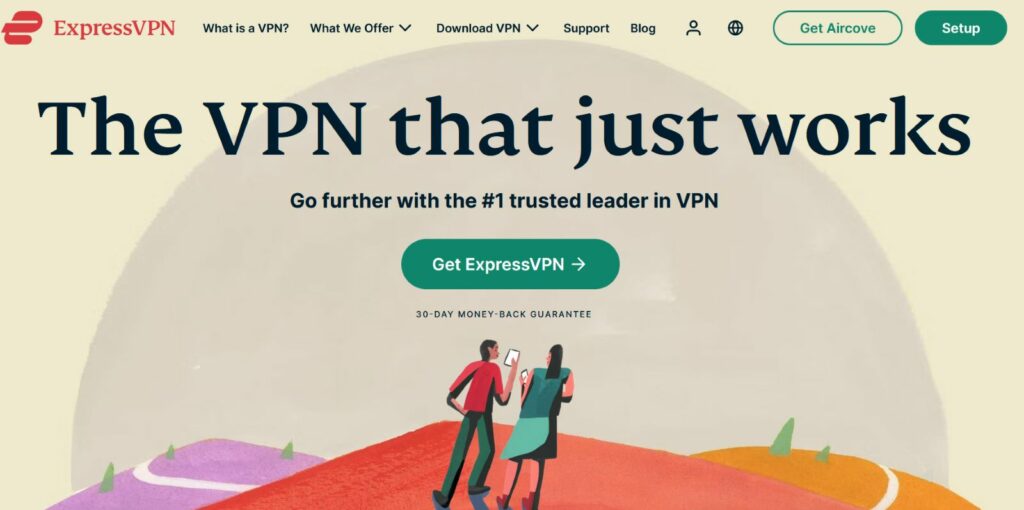
If you’re looking for a VPN that’s easy to use, fast, and secure, I highly recommend ExpressVPN.
It’s one of the most reliable VPNs on the market and is perfect for travelers who want to stay safe online without the hassle of a difficult set-up.
Why I Recommend ExpressVPN
- Top-notch security: ExpressVPN uses advanced encryption to keep your data safe.
- Blazing fast speeds: Whether you’re streaming, browsing, or downloading, you won’t experience lag.
- User-friendly: The app is easy to set up and works on all your devices, including computers, phones, and even tablets.
- 24/7 customer support: If you ever have a question or run into an issue, they have a help chat with live agents.
- Thousands of servers: With servers in over 90 countries, you can access content from virtually anywhere in the world.
- Affordable: If you get an annual subscription you can save 25% compared to the monthly plan.
- Password manager: Always forgetting your passwords to your email or other accounts? Use the built-in password manager to keep track of them!
How to Set Up and Use ExpressVPN
- Sign up for a plan on the ExpressVPN website. They offer a 30-day money-back guarantee, so you can try it risk-free.
- Download the app for your device (Windows, Mac, iPhone, Android).
- Log in with your account information.
- Select a server location based on your needs (e.g., choose a server in your home country to access local content).
- Click or tap “Connect.” Your internet connection is now secure, and you’re free to browse safely!
ExpressVPN also offers handy features like a “kill switch” that cuts off your internet if the VPN connection drops, ensuring that your data is never exposed.
I’ve used ExpressVPN for about a year now and have been very happy! I have it installed on all my devices and use it daily.
Final Thoughts
Traveling should be about enjoying new experiences, not worrying about online security. By using a VPN, you can protect your personal information, access the content you love, and enjoy your trip without any tech stress. And if you want a reliable, fast, and secure option, ExpressVPN is my best recommendation.
Remember, staying safe online is just as important as keeping your passport secure. With a VPN, you can explore the world with peace of mind, knowing that your data is protected wherever you go. Happy travels!
Save to Pinterest
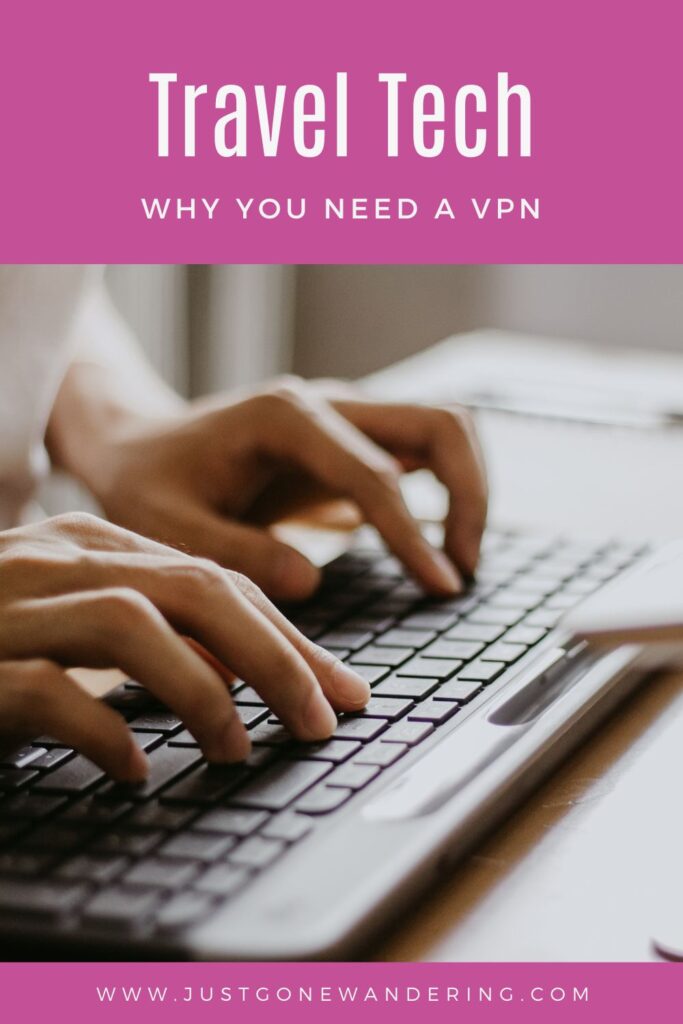
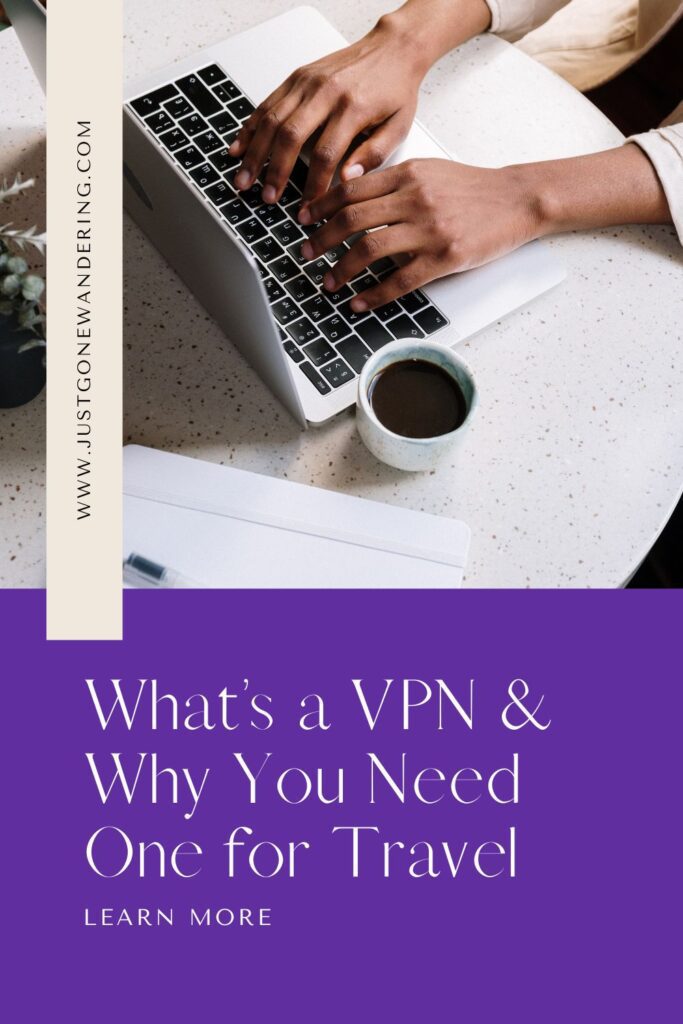
Explore More
Nomad Living
- How to Plan a Year of Full-time Travel
- Packing List for Perpetual Travel (Solo Female Cozy Budget Style)
- Backpack vs. Suitcase for Long-Term Travel
- How to keep in contact while traveling abroad
- The BEST WhatsApp Travel Group Chats
- 90+ Active Facebook Groups for Travelers
- Where to Stay Besides Hotels When Traveling Long-Term
- Travel kitchen essentials | Hotel cooking
- Best Resources for Long-Term Travel
Best Travel Resources
- 👩💻Stay organized with the Deluxe Travel Planner Spreadsheet
- 🛌Search Hostelworld for budget stays
- ✈️Search SkyScanner for discounted flights around the world
- 😺Join TrustedHousesitters and do petsitting in exchange for accommodation
- 💳Carry Chase Sapphire Preferred for a travel-friendly credit card
- 📱Use Airalo for eSIMs around the world
- 🚙Check DiscoverCars for international car rentals
- 👩💻Snag ExpressVPN to stay safe while browsing the web
- 🧑⚕️Sign up with VisitorsCoverage for trip insurance

